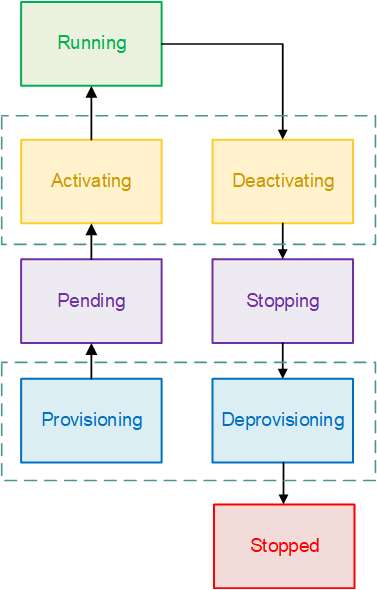Amazon ECS task lifecycle
When a task is started, either manually or as part of a service, it can pass through
several states before it finishes on its own or is stopped manually. Some tasks are
meant to run as batch jobs that naturally progress through from PENDING to
RUNNING to STOPPED. Other tasks, which can be part of a
service, are meant to continue running indefinitely, or to be scaled up and down as
needed.
When task status changes are requested, such as stopping a task or updating the
desired count of a service to scale it up or down, the Amazon ECS container agent tracks
these changes as the last known status (lastStatus) of the task and the
desired status (desiredStatus) of the task. Both the last known status and
desired status of a task can be seen either in the console or by describing the task
with the API or Amazon CLI.
The flow chart below shows the task lifecycle flow.

Lifecycle states
The following are descriptions of each of the task lifecycle states.
- PROVISIONING
-
Amazon ECS has to perform additional steps before the task is launched. For example, for tasks that use the
awsvpcnetwork mode, the elastic network interface needs to be provisioned. - PENDING
-
This is a transition state where Amazon ECS is waiting on the container agent to take further action. A task stays in the pending state until there are available resources for the task.
- ACTIVATING
-
This is a transition state where Amazon ECS has to perform additional steps after the task is launched but before the task can transition to the
RUNNINGstate. This is the state where Amazon ECS pulls the container images, creates the containers, configures the task networking, registers load balancer target groups, and configures service discovery. - RUNNING
-
The task is successfully running.
- DEACTIVATING
-
This is a transition state where Amazon ECS has to perform additional steps before the task is stopped. For example, for tasks that are part of a service that's configured to use Elastic Load Balancings target groups, the target group deregistration occurs during this state.
- STOPPING
-
This is a transition state where Amazon ECS is waiting on the container agent to take further action.
For Linux containers, the container agent will send the stop signal defined in your container image to notify the application needs to finish and shut down using the
STOPSIGNALinstruction. This isSIGTERMby default. Then it will send aSIGKILLafter waiting theStopTimeoutduration set in the task definition. - DEPROVISIONING
-
Amazon ECS has to perform additional steps after the task has stopped but before the task transitions to the
STOPPEDstate. For example, for tasks that use theawsvpcnetwork mode, the elastic network interface needs to be detached and deleted. - STOPPED
-
The task has been successfully stopped.
If your task stopped because of an error, see Viewing Amazon ECS stopped task errors.
- DELETED
-
This is a transition state when a task stops. This state is not displayed in the console, but is displayed in
describe-tasks.